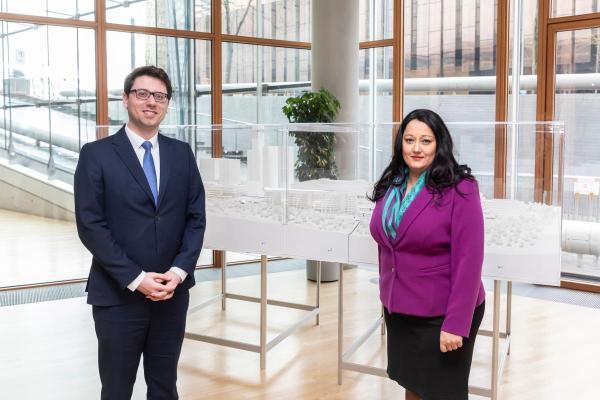
- Kosovo Delegation visited the Bank’s headquarters in Luxemburg to meet with VP Lilyana Pavlova
- The EIB is ready to increase its support to Kosovo and the Western Balkans under the European Union’s Economic and Investment Plan and to contribute towards decarbonising Kosovo economy
- Since the start of the pandemic in 2020, the EU bank has unlocked €70 million for Kosovo to accelerate recovery from the COVID-19 pandemic and improve wastewater infrastructure
The European Investment Bank (EIB) delegation led by Vice-President Lilyana Pavlova met with Kosovo’s Minister of Finance, Labour and Transfers Hekuran Murati at the Bank’s headquarters in Luxemburg for talks on sustainable development and regional integration of Kosovo. As a long-standing partner of Kosovo, the EIB is firmly committed to support Kosovo in developing energy, transportation, healthcare and environment sectors of its economy. Delegations reaffirmed their willingness to strengthen the cooperation and maximize the financial and technical assistance available under the European Commission’s Economic and Investment Plan. In line with the EU Green Agenda, the Bank confirmed its readiness to support Kosovo in developing a sustainable decarbonisation plan, with a particular focus on the heating sector. Kosovo will also be able to benefit from new EU branch – EIB Global which was set up to increase hands-on, sector-level support on the ground with team of experts working closely with local partners and EU institutions to deliver high-impact projects.
Since the start of the pandemic in 2020, the EIB has unlocked €70 million to facilitate Kosovo’s sustainable social and economic recovery. The funds were provided under the Team Europe initiative and have helped small and medium enterprises safeguard their liquidity, staff and operations during the COVID-19 pandemic. They have also made it possible to build wastewater plants in Mitrovica and Gjilan, which will contribute to cleaner environment, increased resilience to climate change and improved sanitation services for over 300 000 people.
EIB Vice-President Lilyana Pavlova, responsible for the Western Balkans said: “We are glad to be able to meet with Kosovo Delegation today and talk about concrete way of strenghtening our collaboration, in order for us to better serve the needs of Kosovo’s people, in line with EU policy. Our aim is to increase both our financial and technical support in the key sectors that will enable transition to a greener, more connected, and inclusive economic model. As the EU Climate Bank, we are working with the European Commission and other partners in the region to advance the development of important strategic investments that will help implement the Green Agenda, the Digital Agenda and boost private sector development. We want to see Kosovo progress it this direction as well, and our strong pipeline of projects could encourage this transformation to a more sustainable economy.”
Hekuran Murati, Minister of Finance and Transfer of Kosovo, stated: “It is always a pleasure to meet with our key development partners, as such I wanted to take the opportunity to thank the European Investment Bank for the support provided to Kosovo for many years now. We welcome EIB’s support in carrying out the EU Economic and Investment Plan for Western Balkans. Our cooperation represents key efforts towards the improvement of the lives of our citizens and in fostering stronger ties between Western Balkan countries.
We acknowledge that our path towards EU integration is a common one and therefore we appreciate the EIB’s continuous assistance in pushing forward the materialization of our mutual goals in energy, digitalization and the environment”.
To date, the Bank has supported €300 million worth projects in Kosovo, provided grants amounting to €12 million through the Western Balkans Investment Framework (WBIF), as well as €3.1 million earmarked under the EIB’s Economic Resilience Initiative (ERI).
* This designation is without prejudice to positions on status and it is in line with UNSCR 1244/1999 and the ICJ Opinion on the Kosovo declaration of independence
Background information:
About EIB Global
EIB Global is the EIB Group’s new specialised arm dedicated to increasing the impact of international partnerships and development finance. EIB Global is designed to foster strong, focused partnership within Team Europe, alongside fellow development finance institutions, and civil society. EIB Global brings the Group closer to local people, companies and institutions through our offices across the world.
https://www.linkedin.com/company/eib-global/
About the EIB in the Balkans:
The EIB is a leading international financier in the Western Balkans. Since 2009, the Bank has financed projects worth over €9 billion in the region. Besides continuing its support for the reconstruction and upgrading of public infrastructure, the EIB has since 2010 expanded into many new areas, such as healthcare, research and development, education, and small and medium enterprises. For detailed information on EIB activities in the Western Balkans, please visit: www.eib.org/en/publications/the-eib-in-the-western-balkans.
Economic Resilience Initiative
The Economic Resilience Initiative (ERI) was created in 2016 in response to a call from the European Council. The objective of the initiative is to help shift patterns of migration in the medium to long term and provide support to forcibly displaced populations by increasing the resilience of economies to future shocks. The ERI is doing this by mobilising finance to support growth, job creation, vital infrastructure projects and social cohesion in the European Union’s neighbouring regions.
Western Balkans Investment Framework
The Western Balkans Investment Framework (WBIF) is a regional blending facility supporting EU enlargement and socioeconomic development in Albania, Bosnia and Herzegovina, Kosovo, Montenegro, North Macedonia and Serbia. The WBIF was established in 2009 as a joint initiative of the European Commission, the Council of Europe Development Bank, the European Bank for Reconstruction and Development, the European Investment Bank, and several bilateral donors.